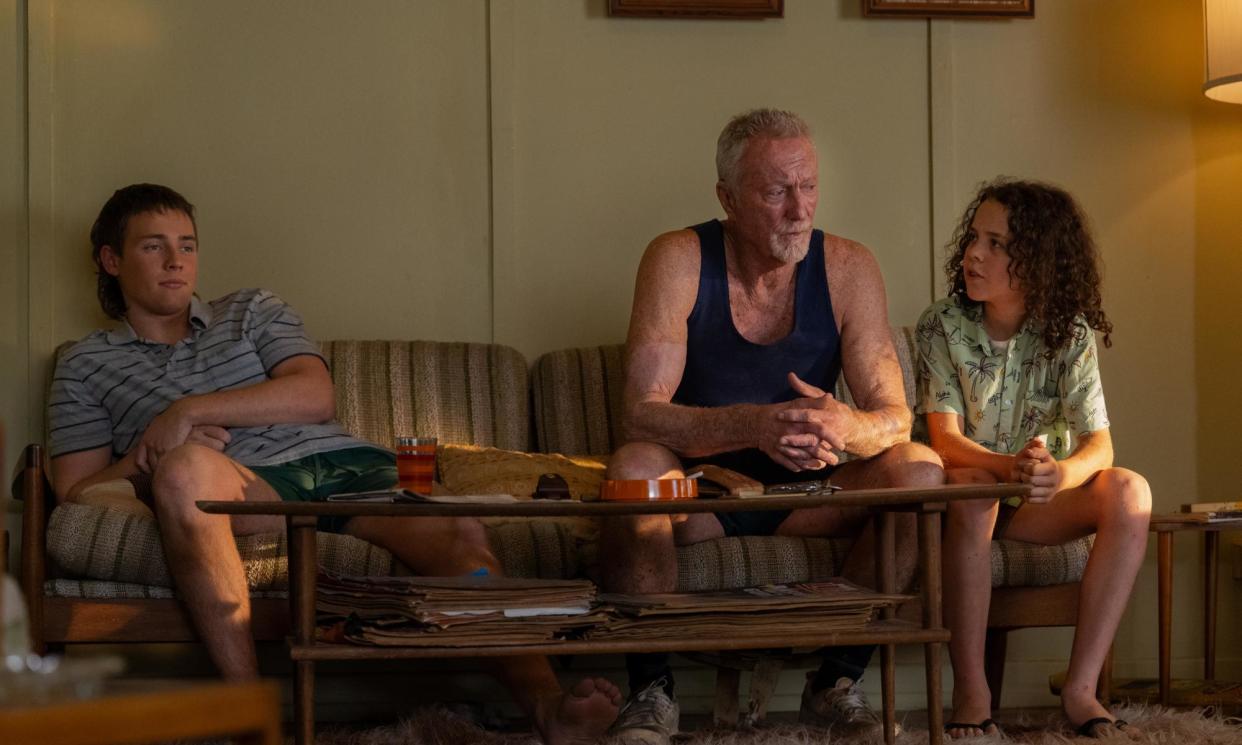Boy Swallows Universe review – Netflix’s Trent Dalton adaptation is one of a kind

Netflix’s seven-part adaptation of Trent Dalton’s acclaimed novel Boy Swallows Universe has a wonderful kind of tonal elasticity, stretching from despair to happiness in a heartbeat. Directors Bharat Nalluri, Jocelyn Moorhouse and Kim Mordaunt expand a sprawling storyline with the kind of worldbuilding I associate more with video games and fantasy narratives, infusing scuzzy settings with a heightened, almost magical realism, a transcendental energy niggling at the show’s edges.
Like the book, Boy Swallows Universe is set in lower-class Brisbane circa 1985, a city filled with lowlifes and troublemakers who orbit the life of 13-year-old protagonist Eli (Felix Cameron and then Zac Burgess). They include his mentor, Slim (Bryan Brown), his dad, Robert (Simon Baker), his mother, Frances (Phoebe Tonkin) and her boyfriend, Lyle (Travis Fimmel), yet another father figure. There’s also Eli’s mute older brother, Gus (Lee Tiger Halley), who communicates by writing words in the air with his finger, displayed for the audience in white powdery letters like skywriting from a tiny plane.
The series kicks off with goons dragging Lyle away and throwing him in the boot of a car: an intense opener incongruously followed by Eli’s wholesome narration: “Our mum really is the best in the world” – which reflects the tone of the whole show: ugly adult realities fused with a youthful outlook.
The storyline is more a scattered array of vignettes than a plot per se, covering – among other things – Eli assisting Lyle with drug dealing, engaging with various underworld figures, dealing with bullies at school and exchanging letters with an imprisoned pen pal (Adam Briggs). There are recurring visions of Eli and Gus in a car flying through space, which begin as dream sequences but are interestingly recontextualised, moved into the realm of memories or quasi-flashbacks.
The tone of the show is a little lighter than in the novel, which feels more down and dirty. Dalton’s book left me in two minds: while I respect the form and craft of his prose, I found it rather haphazardly plotted and lacking momentum. The TV series is also structurally chaotic – but there’s usually a sense the directors have their feet on the gas.
When it’s good, this series can be very, very good: a one-of-a-kind Australian period piece
Boy Swallows Universe’s biggest problem is the disappointing final episode, which spectacularly struggles to translate the book’s admittedly wild ending. There’ll be no spoilers here; suffice to say that a dramatic denouement – and the events leading up to it – throw the series’ entire equilibrium out of whack. Things get very Scooby Doo-ish very quickly, to the point where I half expected a moustache-twirling character to snarl “and I would’ve gotten away with it if it wasn’t for you meddling kids!”
Yet so much of this series impresses. The directors capture crime and scumbaggery in a way we don’t see very often – with a bright and juicy colour palette and an air of heart and humour. The show never looks down on characters, nor does it turn a blind eye to their terrible behaviour.
The cast is very strong. Travis Fimmel is dynamite as Lyle, a man who stomps around with a crazed step in his gait, trying hard and failing spectacularly. Phoebe Tonkin persuasively embodies Frances, imbuing her with a complex combination of tender and torture. And Simon Baker, his eyes still heavy and red from all that heroin in Limbo, packs a punch as Eli and Gus’ dad – another character bluffing through life with a bad hand, fighting off the feeling that it’s too late to start again.
Felix Cameron and Zac Burgess are fine as Eli, but I found something a little ill-fitting about their presence, perhaps a tad clean-cut for this hard-knuckled world. I get that their wholesomeness is partly the point – Eli’s youthful zest serves as a contrast to the adults – but for me, still, they didn’t quite sit right. I wonder if the youngsters could have been directed towards delivering a more unsettled performance, still capturing that ring of innocence and optimism but in a rawer and heavier way, perhaps like Jean-Pierre Léaud in The 400 Blows or Quvenzhané Wallis in Beasts of the Southern Wild, high though that benchmark may be.
Related: ‘Extraordinary and beautiful storytelling’: Boy Swallows Universe wins ABIA book of the year
Boy Swallows Universe sometimes in fact reminded me of the latter in its treatment of light and dark, its portrayal of people in the gutter reaching for the stars. It’s not as tonally controlled as Benh Zeitlin’s great film, that’s for sure – particularly when it reaches that ending, which was so jarring I rewatched the last two episodes just to try to make peace with it. But when it’s good, this series can be very, very good: a one-of-a-kind Australian period piece.
Boy Swallows Universe in on Netflix from Thursday.

 Yahoo News
Yahoo News 
